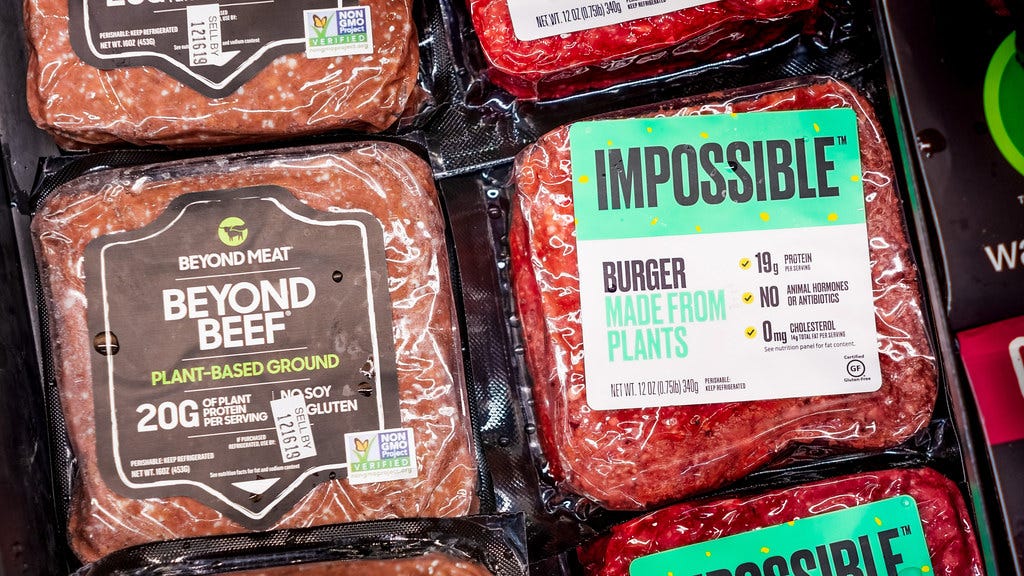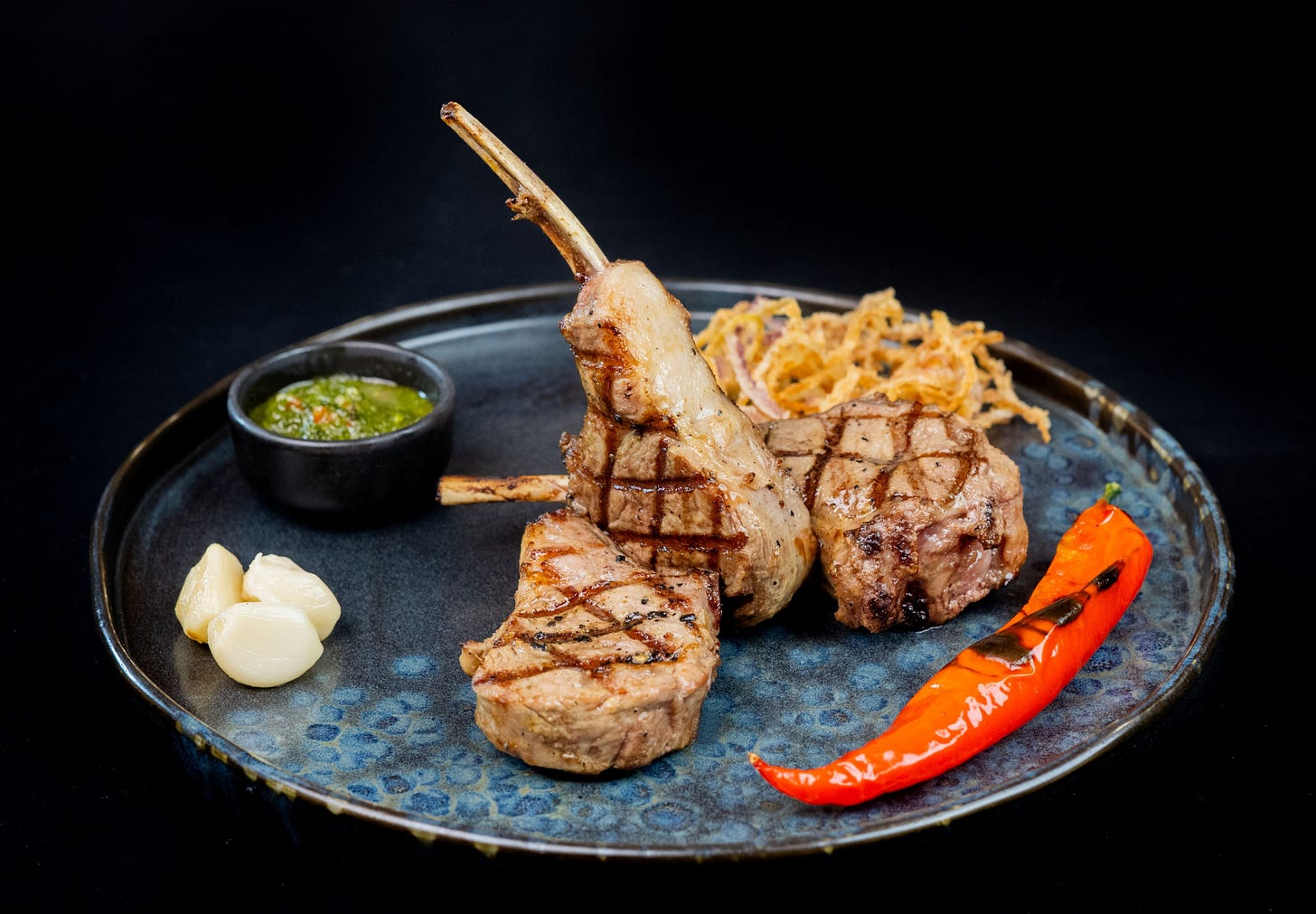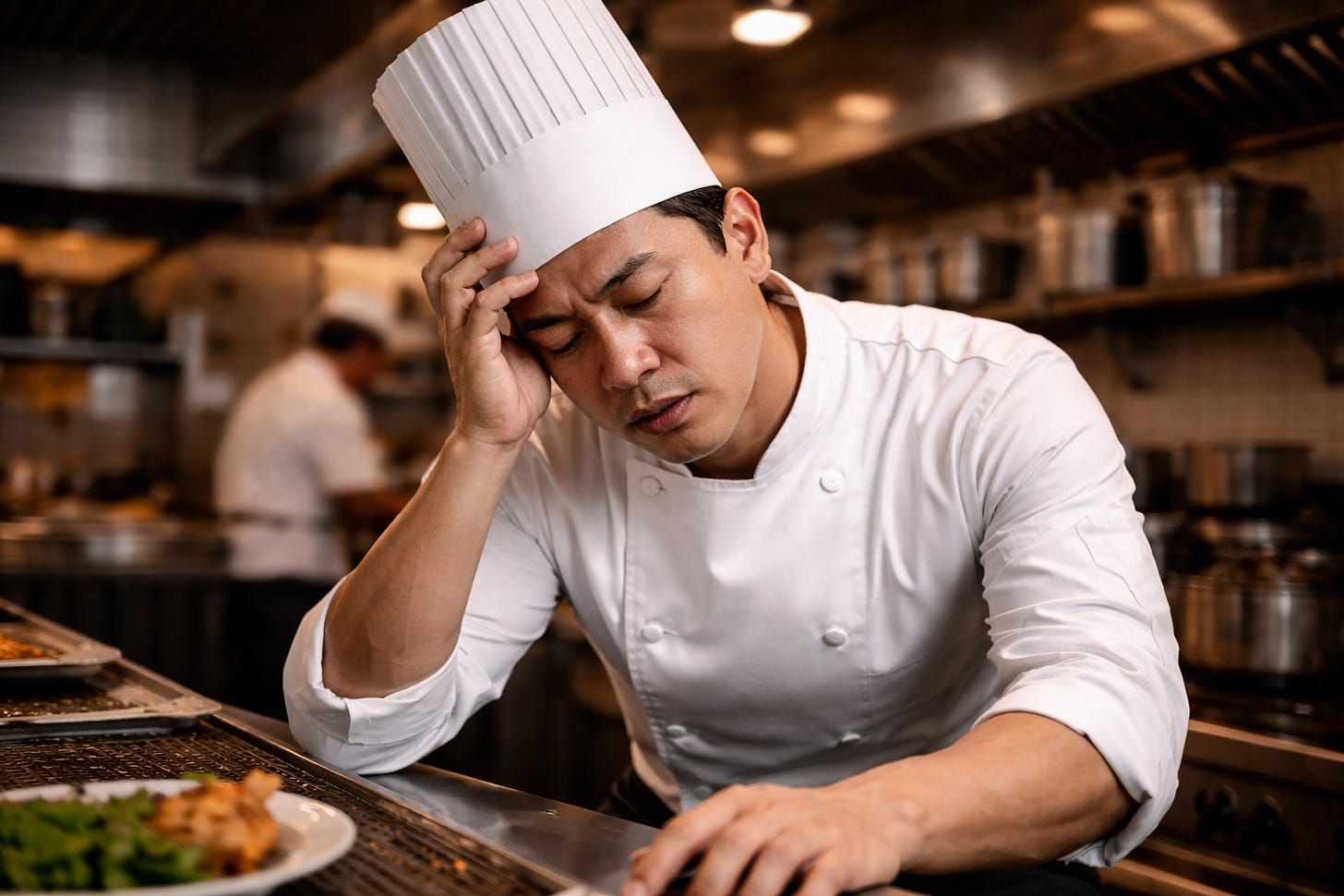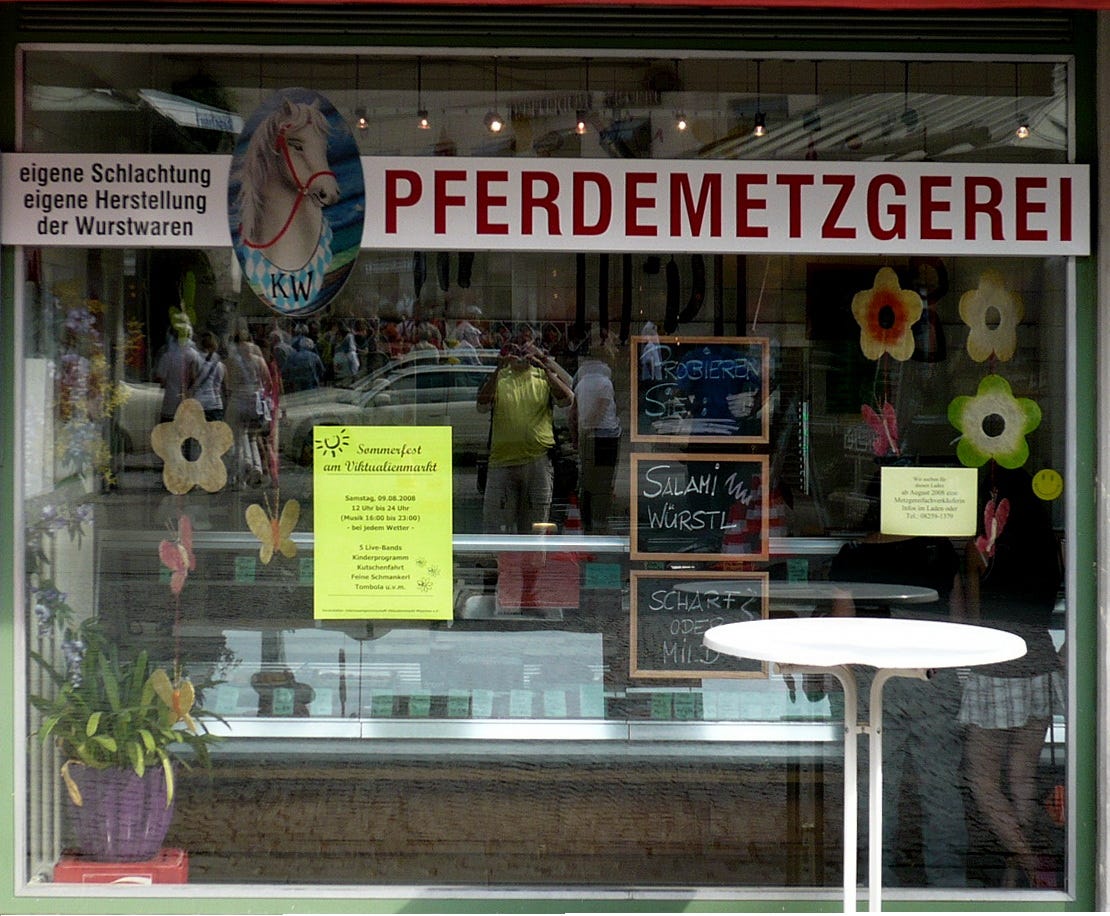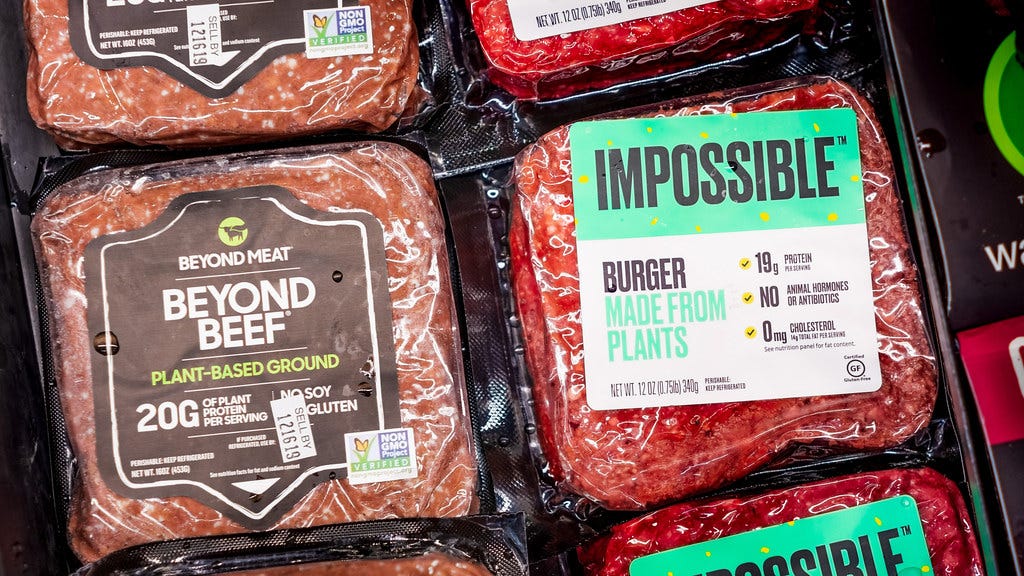
by lspeed | Mar 1, 2026 | Uncategorized
We have been running high volume steakhouses long enough to recognise patterns, not only in Asia where we operate, but internationally. Food trends always arrive with conviction, confidence and usually a lot of press and influencer fluff. They peak somewhere between curiosity and virtue, and then quietly test whether guests actually want to order them twice.
Molecular foams had their moment. Activated charcoal had its fifteen minutes. Sous Vide found a secure place in modern culinary processes, and gold leaf still turns up occasionally, clinging stubbornly to desserts that never asked for jewellery.
So when plant based meat arrived, we did what we were supposed to do. We listened, we tasted, we ran some numbers, and then we put it on our menu. The motivation was not ideological, but practical. We were also a bit tired of that those moments at the table when seven enthusiastic carnivores pause politely while the eighth guest asked if there is anything suitable for them.
Plant based meat promised to smooth that moment out, offering familiarity without compromise, at least in theory. We started where the category performs best, with burgers. Later we tested the products with a few of our Asian dishes, because any product that can’t survive a hot wok, a grill and a sauce with a strong personality is unlikely to last long in this part of the world.
Then we waited and observed. A year later, we took it all off the menu again.
The numbers told the story with brutal clarity. On average, plant based meat generated roughly one order a month. Occasionally two, often none. This was not quiet sabotage, and we did not hide it in small print or price it punitively. The kitchen handled it with care, the service team understood the product, and it sat visibly on the menu for all to see.
Guests simply did not order it. What surprised us was not the reaction of dedicated meat lovers, which was always predictable. What surprised us was Asia, because Asia does not need fake meat, and this is where Western narratives misread the room.
Asian Chefs have been cooking deeply satisfying plant based food for centuries, without pretending it is something else. Tofu, tempeh, mushrooms, jackfruit, wheat gluten and fermented beans are not substitutes or apologies. They are complete cuisines in their own right, built on technique, texture and umami rather than imitation.
If you grow up with mapo tofu, you do not crave pea protein pretending to be pork. And if you are familiar with Buddhist vegetarian cooking, mock goose included, you already understand structure and savouriness without needing the illusion of beef. When a food culture is grounded in balance, fermentation and layering of flavours, novelty alone struggles to hold attention for very long.
Impossible Pork basil rice, plant based Rendang, and fake Satay made some sense conceptually. But in execution, they fall short. Stir frying is unforgiving, and high heat exposes texture immediately. Oil absorption becomes unpredictable, and sauces highlight weaknesses rather than hide them. What behaves well between a bun does not necessarily behave well in a wok.
Price compounded the issue. Asia’s foodies are intensely price literate, and know what pork and chicken and tofu and vegetables cost. Asking them to pay more for something more processed, less familiar and not clearly tastier was always going to be a challenge. Once the novelty faded, logic returned to the table. Health perceptions did not rescue the category either. Ultra processed is not a compelling selling point in a region where wet markets, fresh produce and daily shopping are still part of everyday life.
From our perspective as a restaurant operator, the negatives started piling up. Storage requirements were awkward, shelf life was short, and supply was inconsistent. Staff had to remember special handling protocols for an item ordered once a month. Menu space is finite and every dish has to justify its place. This one did not, so we removed it. End of story.
Does this mean plant based meat is finished. Not at all, we say, just that the hype phase is over, and whatever comes next will need to earn its place honestly. We see three future scenarios look plausible:
Blended Meats
This is the most realistic path forward. Burgers that are mostly beef with plant proteins folded in for yield and sustainability. Sausages that use mushrooms for juiciness and structure. Less meat rather than no meat. Taste remains familiar, price pressure eases, and environmental impact improves without asking guests to make a philosophical leap. Asia tends to favour pragmatic compromise over absolutism, and this approach fits that mindset well.
Food That Stops Pretending
The strongest vegetarian dishes in Asia succeed because they are honest. Tofu tastes like tofu, and mushrooms taste like mushrooms. Mycelium is used for texture, not disguise. When plant based products aim to be delicious on their own terms rather than imitating steak, chefs can actually work with them creatively. This shift is already happening quietly, and it feels far more durable.
Functional Niches
Airlines, hospitals, institutional catering and disaster relief environments value shelf stability, protein density and standardisation more than romance. Plant based meat fits these use cases well. It does not need to be loved, just to work.
As successful steakhouse operators, we never felt threatened by plant based meat. If anything, the experiment reaffirmed something reassuring. People who want steak will order steak, and people who want vegetables are perfectly happy eating vegetables. Especially in Asia, where plant based food never needed a lab coat to be taken seriously.
Image Credit: https://www.bath.ac.uk/ (University of Bath)
_ _ _
© CHURRASCO PHUKET STEAKHOUSE / ALL RIGHTS RESERVED
Reprinting, reposting & sharing allowed, in exchange for a backlink and credits
Churrasco Phuket Steakhouse serves affordable Wagyu and Black Angus steaks and burgers. We are open daily from 12noon to 11pm at Jungceylon Shopping Center in Patong / Phuket.
We are family-friendly and offer free parking and Wi-Fi for guests. See our menus, reserve your table, find our location, and check all guest reviews here:
https://ChurrascoPhuket.com/
#Churrascophuket #jungceylon #phuketsteakhouse #affordablewagyu #wagyu
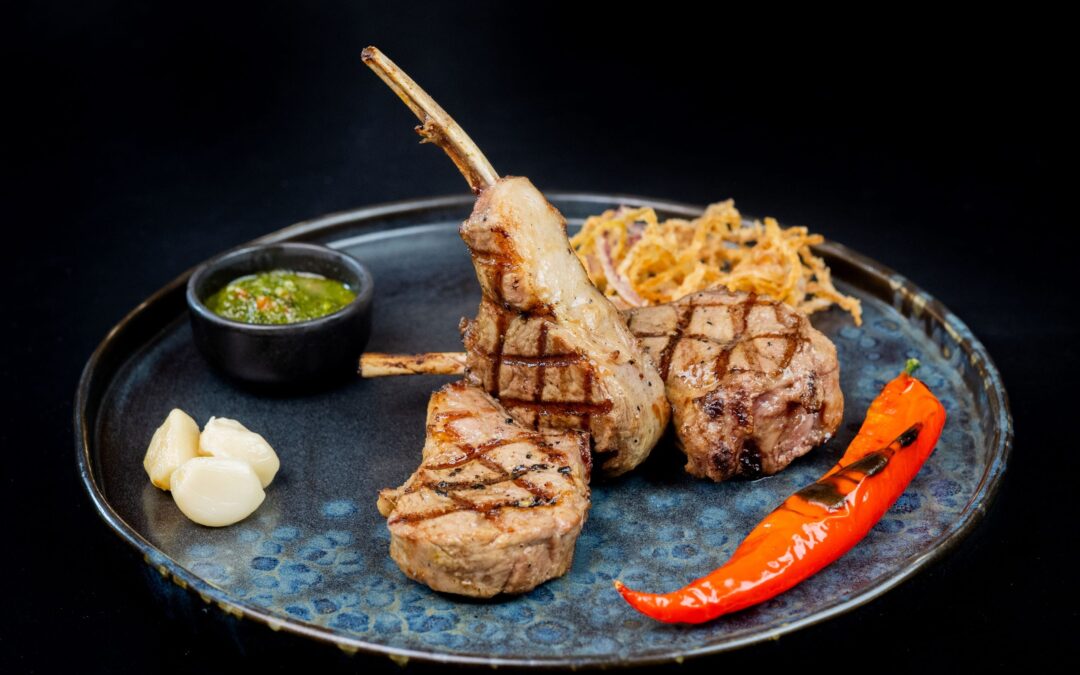
by lspeed | Feb 25, 2026 | KNOWLEDGE: MEAT ESSENTIALS
If there is one contest that runs deeper than rugby, cricket, or who invented the flat white, it might just be lamb. Put a Kiwi and an Ozzie in the same room and casually mention sheep, and you will want to reach for the popcorn and enjoy the show.
Both countries are global heavyweights in lamb production. Both export to the world, and are equally fiercely proud of their farming traditions. And both will quietly suggest that the other one is doing it almost right. So what is the actual score when it comes to what lands on your plate?
Round One: New Zealand, Grass Fed and Gloriously Green
New Zealand lamb has built its reputation on purity. Think open hills, dramatic coastlines, and sheep grazing freely on rich, rain nourished pastures. The country’s mild climate and generous rainfall mean lambs spend their lives on grass, not in feedlots. The result is meat that is typically leaner, fine grained, and delicately flavoured. There is a clean, almost herbal note to properly raised New Zealand lamb. It tastes of pasture in the best possible way. Not wild or gamey, just fresh and honest.
Because New Zealand lambs are generally processed at a younger age, the texture tends to be tender and refined. Smaller cuts, elegant racks, and neat chops lend themselves beautifully to quick cooking methods and haute cuisine plating. A hot grill, a well judged roast, or a sharp sear in a pan. You do not need to bully it with heavy sauces or aggressive spices. Let the lamb speak. It usually does so politely, but with quiet confidence.
New Zealand also leans heavily into strict farming standards and traceability. Animal welfare, sustainability, and environmental stewardship are not marketing buzzwords there. They are part of the national identity. For diners who care about how their protein was raised, that matters.
Round Two: Australia, Bigger, Bolder, and Not Shy About It
Australia approaches lamb the way it approaches most things – with scale. Vast landscapes and diverse climates, from dry inland regions to lush coastal pastures. Australian lamb production covers serious ground. While a large proportion of Australian lamb is grass fed, some producers finish their animals on grain. That finishing step changes things, as grain finishing increases intramuscular fat and deepens the flavour profile, just as it does with beef.
The meat often carries a richer, more robust taste and a slightly fattier mouthfeel. Australian lamb also tends to be larger. Bigger shoulders, larger legs, and cuts that feel designed for Sunday roasts, slow braises, and dishes that demand presence. If you are building a lamb curry that needs to hold its own against spice, or a slow cooked stew that simmers for hours, Australian lamb steps into the ring with confidence. It’s bold, it’s hearty, and it does not whisper.
So What Is the Score: The Taste Debate
The fun part of this rivalry is that it mirrors the broader New Zealand versus Australia dynamic. The Kiwis will say their lamb is cleaner, more refined, and raised in greener conditions. The Australians will counter that theirs has more depth, more character, more punch. It is a bit like comparing two great rugby teams. Style versus power, and precision versus impact. Both can win, depending on the day and the crowd.
From a chef’s perspective, the choice often comes down to intent. Do you want a lamb rack that shines with just salt, pepper, and careful grilling? New Zealand is hard to beat. Do you want a shoulder that collapses into sticky richness after hours in the oven? Australia may have the edge.
Neither is “better” in some universal sense. They are simply different expressions of climate, feed, farming philosophy, and culinary tradition. In essence, the world is lucky to have both. Between them, New Zealand and Australia have set the global benchmark for exported lamb. The rivalry keeps standards high. The competition drives improvement, and diners everywhere benefit.
As for the bragging rights across the Tasman Sea, that debate will continue long after the last chop has been served. Which is probably exactly how both countries like it.
Image Credit: https://churrascophuket.com (Actual Menu Picture)
_ _ _
© CHURRASCO PHUKET STEAKHOUSE / ALL RIGHTS RESERVED
Reprinting, reposting & sharing allowed, in exchange for a backlink and credits
Churrasco Phuket Steakhouse serves affordable Wagyu and Black Angus steaks and burgers. We are open daily from 12noon to 11pm at Jungceylon Shopping Center in Patong / Phuket.
We are family-friendly and offer free parking and Wi-Fi for guests. See our menus, reserve your table, find our location, and check all guest reviews here:
https://ChurrascoPhuket.com/
#Churrascophuket #jungceylon #phuketsteakhouse #affordablewagyu #wagyu

by lspeed | Feb 22, 2026 | BLACK BOX: RANTS, RAVES, REVIEWS & RECIPES
The word hospitality sounds warm, fluffy, and faintly scented with fresh linen. In reality, its origins are far more practical and life saving. Hospitality comes from the Latin hospes, which meant both host and guest. One word, two roles, and utterly confusing – but it gets better. Closely related is hostis, which originally meant stranger and later evolved into enemy.
So yes, hospitality began as a system for dealing with people you did not know and were not entirely sure would behave themselves. The original idea was simple. Strangers arrive, you feed them, give them shelter, establish rules, and everyone survives the night. This was not kindness, just practical risk management.
In ancient Greece, this system was called Xenia. Guests were fed and cared for before anyone dared ask awkward questions like “who are you” or “why are you here with that sword”. Zeus himself supposedly protected guests, which was divine encouragement not to poison anyone at dinner. Breaking hospitality rules was not just rude, it was considered a cosmic mistake.
The Romans, never ones to leave things informal, turned hospitality into a structured social contract. Hosts and guests exchanged tokens, promises, and obligations that could last generations. Imagine checking into a hotel today, and being told your grandchildren were now legally obliged to invite the owner’s grandchildren for lunch.
Meanwhile, Asian cultures had perfected hospitality to both an art form and a social minefield. In much of East Asia, hospitality revolves around ritual and restraint. In Japan, guests are offered tea, silence, and immaculate order. The unspoken rule is that everyone must pretend not to be a burden while actively trying to outdo each other in politeness. The guest apologises for arriving. The host apologises for the house not being perfect. Everyone bows, and no one relaxes until dessert or next week.
China takes a more robust approach. Hospitality means feeding guests until they can no longer stand, then insisting they eat more. Refusing food is polite, and insisting harder is mandatory. The host worries you are starving, while guests worry they will never fit into their trousers again. This is considered a successful evening and the beginning of a mutually beneficial relationship.
In Southeast Asia, hospitality often comes with warmth, spontaneity, and zero personal space. You are not a guest for long, but family. Family sits down and eats, then asks and answers personal questions within the first five minutes. Declining food is suspicious, and declining a second serving is a declaration of war.
But all across Asia, one rule remains consistent: a guest must be looked after. Comfort is important, but dignity – the famous “face” – matters more, and for both sides. Hospitality is not about showing off, but about not embarrassing anyone, especially yourself.
Over time, hospitality moved indoors and donned uniforms. Inns became hotels, and hosts became staff. Guests became customers, with online reviews and strong opinions about pillow firmness. The ancient fear of strangers disappeared, replaced by different anxieties, like WiFi speed or late check-out times.
Today, hospitality is measured in response times, smile training, and whether the cappuccino arrives with a heart etched into the foam on top. But underneath the polished surfaces, the old instincts are still there. When guests walk in, you want them to feel safe, and welcome. Preferably fed too, of course.
So the next time someone says hospitality is about food or service, remember its deeper meaning. It started as a survival strategy, a way to turn unknown strangers into temporarily protected humans. The fact that it now includes wine lists, reservation systems, and heated lemongrass face towels is just progress.
At its heart, hospitality is still the same ancient agreement. You come in peace, and we will take care of you. So please do not burn the place down …
Image Credit: https://www.freepik.com/
_ _ _
© CHURRASCO PHUKET STEAKHOUSE / ALL RIGHTS RESERVED
Reprinting, reposting & sharing allowed, in exchange for a backlink and credits
Churrasco Phuket Steakhouse serves affordable Wagyu and Black Angus steaks and burgers. We are open daily from 12noon to 11pm at Jungceylon Shopping Center in Patong / Phuket.
We are family-friendly and offer free parking and Wi-Fi for guests. See our menus, reserve your table, find our location, and check all guest reviews here:
https://ChurrascoPhuket.com/
#Churrascophuket #jungceylon #phuketsteakhouse #affordablewagyu #wagyu
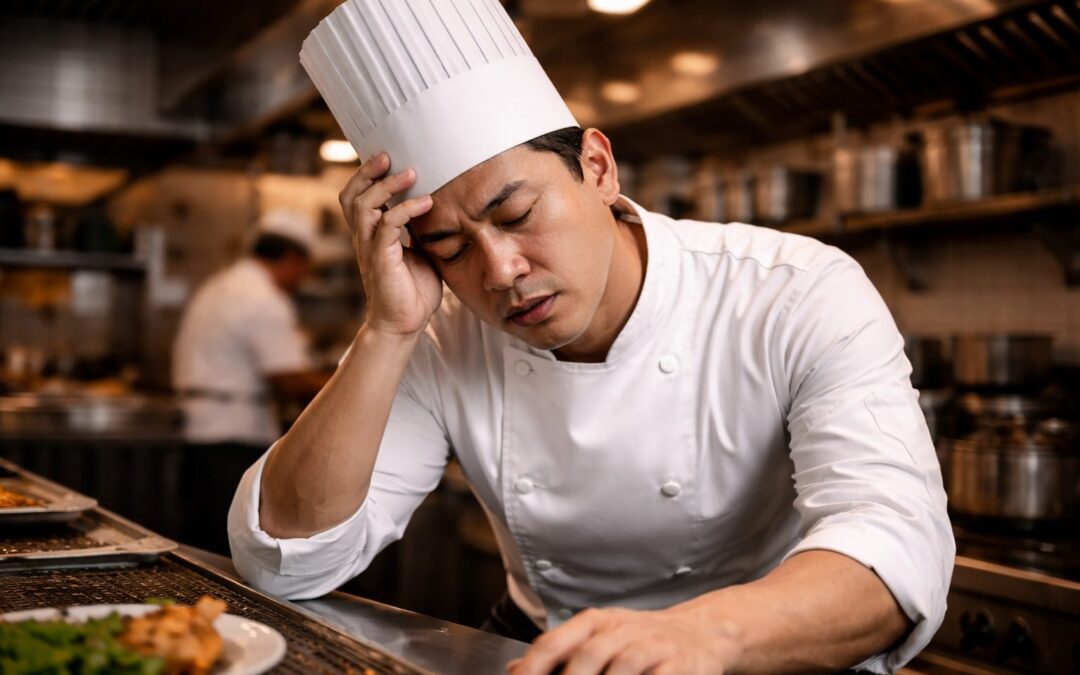
by lspeed | Feb 18, 2026 | RESTAURANT BUSINESS: BEHIND THE KITCHEN DOOR
One of the quotes I like to use in speeches, such as at the recent Gourmet Vietnam Awards, goes like this: ”You don’t have to be a bit crazy to be a Chef, but it often helps”. Every kitchen has its rituals, which help organise and subdue the chaos. But then there is that ritual nobody puts on the prep list.
Substances used to take the edge off. The pill to stay sharp, or to come down, or to sleep. The thin white line, snorted to feel less, or to feel anything at all at the end of a full-on shift. Addiction in professional cooking is not a niche problem, but a reasonably common and hidden part of kitchen life. It does not care whether the restaurant is a humble neighbourhood grill, or a white tablecloth temple of tweezers.
How widespread is it, really?
If you zoom out from “Chefs” to the broader world Chefs work in, the data is blunt. In the United States, the accommodations and food services industry has had some of the highest reported rates of past month illicit drug use among full time workers. At 19.1 percent in analysis of national survey data, it also showed the highest rates of past year substance use disorder in that same report.
Alcohol is not a side note either. Research using national household survey data has found restaurant workers reporting heavy alcohol use at roughly double the rate seen across all industries in that analysis. On the mental health side, large hospitality surveys regularly report high levels of distress. One widely cited hospitality survey from The Burnt Chef Project reported that 80 percent of respondents had experienced mental health issues because of their role.
None of this proves that “all Chefs are addicts.” It does show that kitchens operate in an environment where risk is disproportionally high, and where the line between coping and dependency gets crossed more often than dining rooms will ever notice.
Why do kitchens create the perfect storm?
Addiction rarely starts as a cartoon villain. In kitchens it often starts as a very practical solution to an impossible schedule. Here are the classic ingredients:
Long Hours & Fatigue
When your body clock is treated like an optional garnish, sleep becomes a negotiation. Work related stress research in Chefs links workload and long working days with poorer health outcomes and stress.
Intensity & Adrenaline
Service is a performance with heat, speed, and criticism baked in. Your brain learns that high alert is normal, and normal feels flat.
Culture & Access
After shift drinking, “just one” with the team, staff nights that turn into staff mornings. Add in easy availability of alcohol in hospitality settings and the path gets smoother than anyone admits.
Pain & Injury
Burns, cuts, repetitive strain, standing for hours. Self medication can begin with sore feet and end somewhere darker.
Personality Type
Many Chefs are driven, proud, perfectionist, and stubborn, characteristics that thrive under pressure. Those traits build great plates, but they also make asking for help feel like failure.
What it does to Chefs, and to everyone around them?
Addiction does not stay politely in the back of house. For the Chef, it can mean anxiety, mood swings, unreliable sleep, declining performance, and injuries. Plus that constant private math problem: “How do I get through today.” It often comes with shame, which is an excellent fertilizer for secrecy.
For the team, it can mean inconsistent leadership, unpredictable shifts in tone, more mistakes, more conflict, and the slow normalisation of chaos. People either walk on eggshells or learn to shout back. For owners and managers, it shows up as turnover, absenteeism, accidents, inventory loss, guest complaints, and the grinding cost of replacing skilled people.
The human cost is worse, but the business cost is what usually forces the conversation. For families especially, it is the unforeseen second shift. Broken plans, emotional distance, financial stress. And that awful feeling of watching someone you love disappear while still standing in front of you.
Suicide risk, the part nobody likes to say out loud
Not only since the suicide of multi-hyphenate American Chef and television personality Anthony Bourdain (June 8th 2018) did the issue of Chef suicides enter mainstream discussion. Substance use and mental health struggles increase suicide risk, especially when combined with isolation, exhaustion, and a workplace culture that treats suffering as a badge.
Occupational data in the United States has shown elevated suicide rates for Chefs and head cooks compared with many other occupations. In CDC analysis of 2021 data, Chefs and head cooks were reported at 66.5 deaths per 100,000 for males and 32.9 per 100,000 for females. Cooks were also elevated.
Those numbers are not “kitchen gossip.” They are a public health signal. If you run restaurants, you are not just managing food. You are managing risk. If you or someone you know is in immediate danger, contact local emergency services right away. Do not wait or hesitate.
What actually helps?
Professional kitchens are built on systems, procedures, prep, and more prep. Addiction prevention is the same idea, just less photogenic. The goal is not to have restaurant owners act as analysts and mental health counsellors. Neither is it to create the perfect kitchen brigade. The goal for the people in charge must be to create and run a place with an environment where talented people do not need to numb themselves to keep cooking. To put humanity before profits, and mental balance before performance.
Because the best dish any restaurant can serve is a team that makes it home in one piece. And then comes back the next day ready for a new challenge.
Image Credit: https://churrascophuket.com (AI Generated)
_ _ _
© CHURRASCO PHUKET STEAKHOUSE / ALL RIGHTS RESERVED
Reprinting, reposting & sharing allowed, in exchange for a backlink and credits
Churrasco Phuket Steakhouse serves affordable Wagyu and Black Angus steaks and burgers. We are open daily from 12noon to 11pm at Jungceylon Shopping Center in Patong / Phuket.
We are family-friendly and offer free parking and Wi-Fi for guests. See our menus, reserve your table, find our location, and check all guest reviews here:
https://ChurrascoPhuket.com/
#Churrascophuket #jungceylon #phuketsteakhouse #affordablewagyu #wagyu
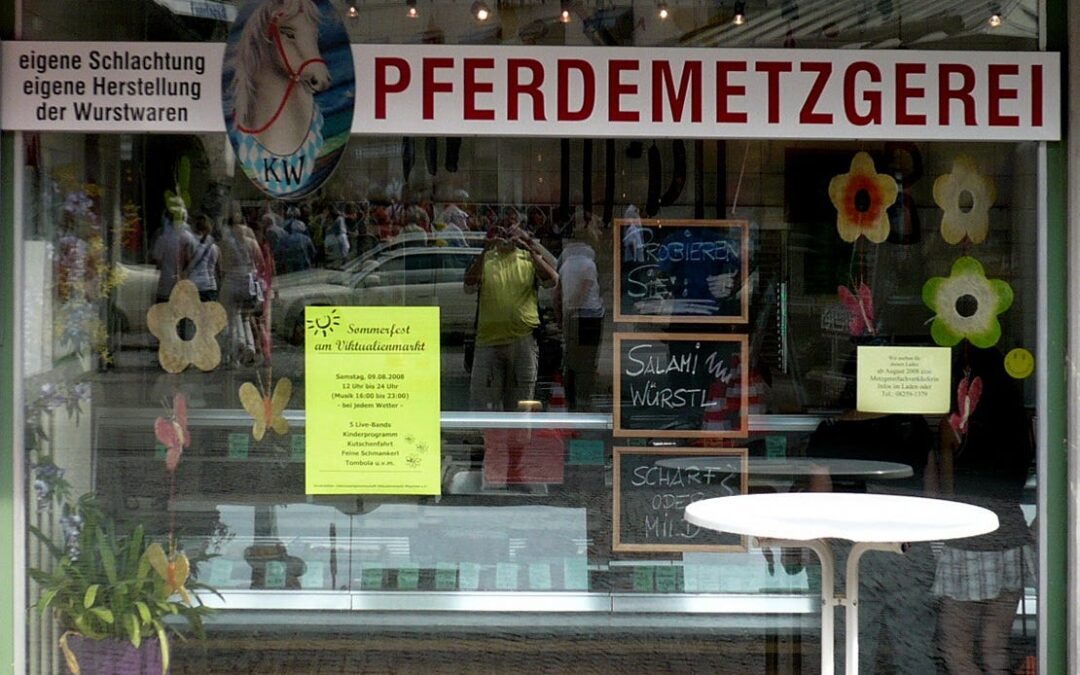
by lspeed | Feb 15, 2026 | KNOWLEDGE: MEAT ESSENTIALS
There are foods you casually mention over dinner. And then there is horse meat. Say the words out loud at a dinner table, and watch the room split neatly into two fully armed opposing camps. One looks intrigued and starts asking questions, the other one is offended and serves up a dish of cold condemnation.
In other words, horse meat is not just a protein, it is a cultural tripwire with hooves. What makes it irresistible as a topic is not shock value, but the fact that it exposes how irrational we can be about our food. We insist we eat logically, ethically, thoughtfully – until someone brings up horse meat and all logic gallops straight out the door.
Survival Over Sentiment
Historically, horse meat was not edgy, but practical. When armies marched, winters bit, or harvests failed, horses were transport first and dinner second. Nomadic cultures across the Eurasian steppe relied on horses for everything from milk to meat. Eating them was not controversial, it was Tuesday’s lunch.
Then some writers of the antique started judging. Roman commentators liked to snipe at northern tribes for eating horses, quietly filing it under barbarian behavior. Medieval Europe then added religion to the mix. The Christian church discouraged horse meat, partly because pagans liked sacrificing horses, and partly because banning things is a classic branding move for clerics.
Yet, hunger has a way of ignoring doctrine. During wars, sieges, and revolutions, horses ended up in cooking pots all over Europe. Paris during the Franco-Prussian War was famously creative, and not in a Michelin way. When food is scarce, moral philosophy takes a holiday.
The Respectable Comeback
By the nineteenth century, horse meat was reintroduced as sensible food for practical people. Doctors praised it and governments promoted it. Specialized butcher shops appeared, often proudly advertising chevaline meat as lean and nutritious. This was not rebellion, but straight forward public health messaging.
Some of those traditions never disappeared. In France, horse meat sits quietly in the background. Traditional horse butchers still exist, usually family run and slightly old school. Customers are loyal, discreet, and completely uninterested in explaining themselves. Italy is less shy. In parts of the Veneto and Emilia Romagna, horse meat is treated like any other ingredient. It appears as carpaccio, braised dishes, and sausages. No drama, no apologies, just good food. Belgium keeps it practical. Horse meat pops up in regional cooking and charcuterie, valued for flavor rather than controversy.
Then there is Japan, where “Basashi” takes things straight to the edgy end of culinary adventure. Raw horse meat, sliced sashimi style, served with soy sauce, ginger, and garlic is prized for cleanliness and texture. No raised eyebrows seen around, just very sharp knives. And across the steppes in Kazakhstan and Mongolia, horse meat is deeply woven into daily life and identity. Horses are respected, celebrated, and eaten – ideas that coexist without complicated emotional gymnastics.
The Hard No’s
Now move across into the English speaking world, and everything changes. In the United Kingdom, Ireland, and the United States, horse meat is basically social arson. Horses are friends, athletes, therapy animals, and childhood storybook heroes. They wear ribbons, have names, and they do not belong on plates. The argument is emotional, not nutritional, and it is rock solid because emotions usually are. This explains why the European horse meat scandal of the early twenty first century triggered so much anger. People were deeply offended, because something sacred had been smuggled into the lasagna.
Ironically, these same cultures eat animals that others would never touch. Think Hinduism and beef, or Islam and Judaism and pork. Food taboos are not universal truths, they are cultural habits enshrined in moral certainty.
The Taste
When taking all those feelings out for a moment, you can learn that horse meat is lean, high in protein, and slightly sweet due to its natural glycogen levels. Texture wise, it sits somewhere between beef and venison. Less fat, cleaner finish, and zero forgiveness if overcooked. This is why experienced chefs who like horse meat treat it gently. Quick searing, raw preparations, or slow braises respect its structure. Horse meat does not accept to be bullied, it needs precision.
The So What
Horse meat will never be universally embraced, and that is perfectly fine. And this article is not about convincing anyone to eat it or even try it. It is about noting how arbitrary our food rules can be. Somewhere along the line, we all decided which animals are cute, which are useful, and which are delicious. Once we learned that, those categories become stubborn.
But because one such ingredient can make reasonable adults argue like philosophers after too much wine, it is doing something interesting. Horse meat reminds us that eating is never just about taste, but about memory and identity. And about who we think we are, and what belongs on our dinner tables.
Image Credit: https://en.wikipedia.org/wiki/Horse_meat#/media/File:Muenchen_Pferdemetzger_Viktualienmarkt.jpg
_ _ _
© CHURRASCO PHUKET STEAKHOUSE / ALL RIGHTS RESERVED
Reprinting, reposting & sharing allowed, in exchange for a backlink and credits
Churrasco Phuket Steakhouse serves affordable Wagyu and Black Angus steaks and burgers. We are open daily from 12noon to 11pm at Jungceylon Shopping Center in Patong / Phuket.
We are family-friendly and offer free parking and Wi-Fi for guests. See our menus, reserve your table, find our location, and check all guest reviews here:
https://ChurrascoPhuket.com/
#Churrascophuket #jungceylon #phuketsteakhouse #affordablewagyu #wagyu


